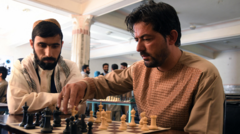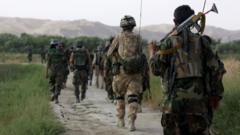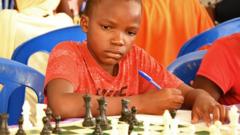Chess, a beloved pastime, is now under scrutiny as the Taliban government emphasizes religious conformity.
Taliban Halts Chess Activities Amid Gambling Fears

Taliban Halts Chess Activities Amid Gambling Fears
Suspension highlights Taliban's strict enforcement of Islamic law on sports.
The Taliban regime in Afghanistan has officially banned chess indefinitely, citing concerns that the game may serve as a medium for gambling activities. The decision comes as officials reflect on aligning the game with Islamic law, which has led to a growing list of sports constraints enforced under the Taliban's strict interpretations of religious regulations.
Atal Mashwani, the Taliban's sports directorate spokesperson, explained that chess is viewed through the lens of sharia law; he indicated that it’s been characterized as a potential gambling source. "Until these considerations are addressed, the sport of chess is suspended in Afghanistan," he stated in an interview with AFP.
The recent ban shines a light on the Taliban's ongoing campaign against various forms of recreation. Gender restrictions remain prominent, with women essentially prohibited from participating in sports altogether since the group's rise to power in August 2021.
Local narratives reveal the impact of this decision on informal chess communities. One cafe owner in Kabul, Azizullah Gulzada, has hosted chess gatherings, allowing young people to engage socially over cups of tea and friendly matches. He expressed respect for the ruling but lamented the negative effects on local leisure activities, as fond memories of chess competitions in other Muslim-majority countries echo in his mind.
The authorities have also targeted other sports, most notably banning professional mixed martial arts (MMA) competitions last summer. Officials claimed that these events posed violence and were not compatible with sharia laws, further tightening the screws on active sporting life in Afghanistan.
As the climate for sports continues to shift under the Taliban's rule, the future of chess and other recreational activities remains uncertain.





















